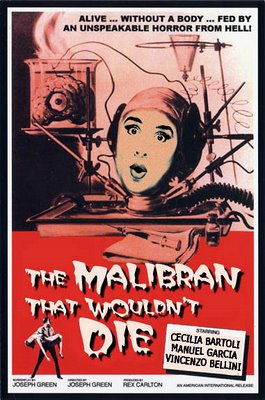
31 January 2008
30 January 2008
What do you think you are? A pair of queens?
 The Met officially announced today that the company will stage Anna Bolena for Anna Netrebko for the opening night of the 2011-2012 season (old news to you, cher public!) and, the following season, Maria Stuarda for Joyce DiDonato.
The Met officially announced today that the company will stage Anna Bolena for Anna Netrebko for the opening night of the 2011-2012 season (old news to you, cher public!) and, the following season, Maria Stuarda for Joyce DiDonato.The company has no current plans to produce Roberto Devereux. In what La Cieca is choosing to consider a stinging slap in the face to -- well, at least one soprano -- Peter Gelb explained, "The problem is casting ....There's no singer around today who can sing [Elisabetta]."
And you may make what you will of la Netrebko's statement about the Bolena: "Fortunately, it's far enough in the future that I'll have time to learn it really well."
28 January 2008
15 January 2008
You love Lucy
Labels: bel canto, guest critic, our own, scotto, youtube
14 January 2008
Lucia di DVD
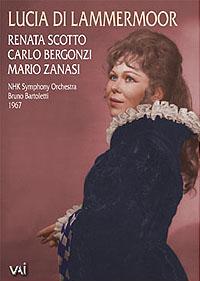 OK, this is IT. Barring the cuts, this is the Lucia of Gaetano Donizetti. Not that misguided travesty at the Met, not Natalie Dessay's vocally juddery overwoughtness. No schtick, no Carol Burnetting around. Just Donizetti and Cammarano's Romantic drama, pure and simple. Real artists, real singers. Performing it straight, as if their lives depended on it. No gimmicks. No BS. You watch this 40 year old performance, and you see and hear a kind of authority and rightness of approach that just doesn't happen often nowadays Here we have music. Here is all the garlic, red wine, passion and organic Italian musical DRAMA. The action contained within the singing. It's a miracle, nothing less.
OK, this is IT. Barring the cuts, this is the Lucia of Gaetano Donizetti. Not that misguided travesty at the Met, not Natalie Dessay's vocally juddery overwoughtness. No schtick, no Carol Burnetting around. Just Donizetti and Cammarano's Romantic drama, pure and simple. Real artists, real singers. Performing it straight, as if their lives depended on it. No gimmicks. No BS. You watch this 40 year old performance, and you see and hear a kind of authority and rightness of approach that just doesn't happen often nowadays Here we have music. Here is all the garlic, red wine, passion and organic Italian musical DRAMA. The action contained within the singing. It's a miracle, nothing less.The picture is a bit grainy, the sets standard issue. Does it matter? Give me a break (NO).
We start with Bergonzi. Tenore supremo. Short, stumpy (yet handsome here), gestures of stock vintage. Yet, he creates drama through voice alone;"Vi disperda!" cuts right to the bone. Debonair in the old-fashioned manner. Ardent, the ultimate tenor hero. Perfect. Voice, voice voice - in awesome form here. "Fra poco a me ricovero" just splendid: it's met with a roaring ovation. Bergonzi and Scotto do not have the sensual interplay of Ricciarelli and Carreras - they don't make a lot of eye contact and are sometimes hilariously buried in their own "work" - but they are together all the way vocally and musically.
Zanasi. "Another" Italian baritone of his time, extinct today. A darkly handsome man, he has a commanding presence. He sings a solid "Cruda, funesta smania," beginning with a slightly muscular overemphasis, yet it suits the piece; but the line, upper extensions of ease, and expression is just right.
Plinio Clabassi. A Raimondo of unusually fine caliber, with a mellow, steady, consummately produced tone - he evinces a genuine control over it, and uses it flexibly - no park and bark approach here. Moreover, he makes the character figure prominently: he really delivers a tale in his "Dalle stanze, ove Lucia," setting up the mad scene fittingly.
Whoever said Scotto was a second-stringer should be thumped on the head, then made to hasten and acquire this release. She is spectacular, nothing short of miraculous here. What may have been accepted as standard then registers as something extraordinary now. Scotto is in marvelous voice: that brisk, tangy sound, slightly piercing on high, is bracingly clear, pure and perfectly steady throughout. She has never sounded more appealing, nor so classically Italianate in tone and manner. Her coloratura, while not of Sutherlandian velocity, is neat, in place, and confidently deployed. Trills are not a prominent thing of disctict articulation, yet they are discerned - and importantly, uses them effectively in the line where called for. High notes pop out quite strongly. What's most important here is she does that all-important shaping and binding of lines into an expressive whole; she has a way of magically "dropping in" and connecting phrases, with a wide range of dynamics, and her diction is an absolute joy - no alteration of vowels or slushing over of them. She makes every word clear, and meaningful. The line in "Regnava nel silenzio" is ideal, true, unfussed, yet so very sustained on a level of gripping narrative. "Verranno a te sull'are" is pristinely, gorgeously sung, as is "Soffriva nel pianto." This kind of cantabile singing should be taken heed by any budding Lucia today.

But what is most especially distinctive is that in each isolated number, she tells a story. You see in her face, the spontaneity of her delivery of the words and expressions, how they register upon the listener as internal thoughts, given out to the audience. What's most important here, though, is that she is so not trying to force external gimmicks onto the characterization. The question never forms in the mind, what kind of a character is Lucia? A spineless wimp? Sick from the start? A mad hatter? No, the Lucia here is one that uninformed individuals will never understand: she is a 19th century Romantic heroine, a girl in love with Edgardo. Scotto reacts in each episode as if the character were hearing the statements of the others in the story for the first time. It has a uniquely-alive spontaneity, unusually free of calculation. I'm sick of the discussion of whether Lucia is mentally ill from the start, based on her occult meanderings in "Regnava nel silenzio;" if anyone knew of literature, religious superstitions and so forth of that time, these were conventional devices in Romantic melodramas. Ghosts and apparitions are commonplace. So, then, Scotto just accepts Cammarano's text, and tells it without any manipulation or presumption. She or we do not think Lucia mentally ill from the get-go.
Scotto's emotional honesty never falters, not once. She is convincing in the scene with Enrico, bringing just the right amount of anguish, her reactions often touching; in "Se tradirmi," you see her pleading to God most plausibly. In the wedding scene, Scotto is riveting, and does what Mariella Devia had a hard time establishing in her La Scala 1992 video: show the abject despair and desolation of Lucia, as the hope drains out of her. Devia has the astounding vocal technique that kept her singing better longer, but she does not have, by a considerable margin, Scotto's all-abiding charisma and out-there personality. Back to the Wedding Scene: the sextet, onto the end of the act, just sizzles and explodes with drama - those voices just pour out with thrilling abandon. Exciting stuff, this.
After all my extravagance of description, I'll have to think of ways to go further concerning the Mad Scene: it's a revelation. One of the best, hands down, I have ever seen performed. Every American soprano and all directors should watch this. This is how it should be done. In the service of the music, no gimmicks.
Scotto is in her element. Intensely musical, letting the scene flow with astonishing naturalness. Again, she's telling a story. The audience doesn't see this, but the TV viewer does: close-ups reveal the soprano absolutely into her music/storymaking. Scotto has the audience confidently in the palm of her hand, but not for a moment is she calculating or manipulative: it is, rather, an artist in full sureness and specific aim in what she is doing - she's fascinating to watch at every point, you can't take your eyes off her. She's living the situation moment by moment. We get no hysterics, no forced "mad acting" or cheap effects (which I despise). Lucia is totally removed from reality, in her childlike state, moving around like a little ghost in her own little but all-consuming world. Apart from a few moments of fright (the "il fantasma" sequence is powerful), she's deliriously happy, living out her bliss with Edgardo. Most of all, though, finally, you get the full power and pathos of what Donizetti intended. Scotto weds the text with the music so skillfully so that you get the full effect how how beautifully they complement each other. She does not allow the music to be compromised, so she takes care to make all the actions fit in, rather than standing out, as is the wont of too many a soprano. Scotto's bravura accomplishment is a triumph, and what a fortuitous circumstance that these documents exist, and that we have privy to them.
The bows and biz in the lengthy applause after the flute with cadenza, is however, pure Scotto. She steps out of character to acknowledge the ovation. No objections at all; it is decidedly part of the show. Very much like Cossotto, oh thank thank you, oh so humble me but I deserve it. I'm beginning to think these kinds of self-possessed artists, who don't display false modesty very well, are the lastingly memorable artists. Infinite self-belief, a healthy dose of the imperious ego, wanting to please, absolutely certain of their merit, and a kind of inborn dementedness: it translates into a very personal charisma, which defines who they are. They're to be preferred. We want personalities, a personal statement, an individual MO. Wallflowers, generic, unidentifiable, pedantic, please go home.
Without a doubt, this is the video Lucia of choice. Even though it's cut, it retains and fleshes out the truest spirit of the piece. -- Niel Rishoi
VAI DVD 4418
Labels: bel canto, guest critic, scotto, telecast
02 December 2007
"Singing Norma Today"
NYC OPERA FANATIC:
Bless her soul,
Bless her golden throat,
All her fans can gloat.
Renée's preparing to chant
The bel canto role.
SIEGLINDE:
Today is for Norma
Norma, the role of the divas of choice.
America's soprano will honor us forever.
Today is for Norma,
As sung by the Beautiful Voice.
RENEE:
Pardon me, is everybody here? Because if everybody's here, I
want to thank you all for coming to my Norma, I'd appreciate
your going even more, I mean you must have lots of better things
to do, and would you please inform my fans, remember fans you know,
they're called the Fleming Flappers, but they're not, because they wouldn't flap
at anyone as wonderful as I am--
Change of plans:
I'm all wrong as a pagan,
Change of plans,
I'll do Eugene Onegin,
Tell the fans,
That I'm not singing Norma today.
01 December 2007
Larger and more fun
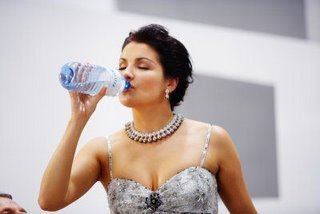 "... Netrebko is the larger presence. She has an earthiness and impishness — a daredeviltry — that may prevent her from ever attaining the kind of rarefied, disembodied sainthood that has been awarded, for example, to the American sopranos Renée Fleming and Dawn Upshaw but that also makes her more fun to watch." Charles McGrath writes a gazillion words or so about "A New Kind of Diva" in this weekend's Sunday Times magazine.
"... Netrebko is the larger presence. She has an earthiness and impishness — a daredeviltry — that may prevent her from ever attaining the kind of rarefied, disembodied sainthood that has been awarded, for example, to the American sopranos Renée Fleming and Dawn Upshaw but that also makes her more fun to watch." Charles McGrath writes a gazillion words or so about "A New Kind of Diva" in this weekend's Sunday Times magazine.In other news, Renée Fleming is still not singing Norma.
30 November 2007
Sgombra è la sacra selva
 As La Cieca's clever public guessed six weeks ago, Renée Fleming is not going to sing Norma.
As La Cieca's clever public guessed six weeks ago, Renée Fleming is not going to sing Norma. "The part just didn't fit as she had hoped it would after living with it," Fleming publicist Mary Lou Falcone said Thursday to the Associated Press. La Fleming, 48 (though she doesn't look a day over 20, does she?), will perform Eugene Onegin under the baton of James Levine next summer at Tanglewood instead of the Bellini work.
Labels: bel canto, fleming, la cieca ci guarda la cieca ci vede
29 November 2007
Running, standing and jumping Gaul
Our Own JJ reviews Hasmik Papian's Druidess in Gay City News.
27 November 2007
Diva, from head to mistletoe
True confession: I love Maria Guleghina, I really, really love her. I know her flaws but her strengths are such that they sweep aside severe demerits that would consign any other artist to filth. Among contemporary singers she is one artist who thinks big, sings big with a big voice and gives everything she has even when it is more than she can afford vocally or artistically. She lives dangerously onstage and at the end of the night there is blood on the stage floor, sometimes hers, sometimes the composer's. She may flirt with vocal disaster but she is never routine or boring.
When she was announced as Norma, I felt some trepidation - would this be the breaking point in my love affair with the Russian diva? This is a role where guts and temperament can only get you so far. A lot of the substance of the role is written into the notes and the range of vocal demands is superhuman. Guleghina's rough, approximate singing at the "Macbeth" new production premiere had earned her critical brickbats (the second performance I attended was much better) and it seemed that bel canto was something beyond her reach at this point. Guleghina has sung Norma before but somewhat outside of the main international circuit and not for a few years.
Now I am sure that over the Sirius network this was not anywhere near a complete musical triumph. However in the house it was certainly impressive and often very, very moving. Guleghina's conception of the role is greater than her technical means of achieving it but she shirks nothing and doesn't shy way from emotional extremes or vocal challenges. As an actress and interpreter she is more consistently successful than as vocalist but she cannot be dismissed as totally provincial or crude. Though a few attempts at delicacy, accuracy and finesse may fail, others will surprise you by succeeding and she scored many points in her acting and singing. The voice is major and imposing and suggests a force of nature. Unlike Papian, she was a fearsome rival and didn't sound like the junior priestess next to Dolora Zajick's majestic Adalgisa.
First of all, she is glorious to behold on stage. She has lost some weight in anticipation of the January "Macbeth" satellite moviecast and the often rather soignée new gowns suited her. Tall and majestic with wide-set flashing eyes, she commanded the stage at all times.
Guleghina is often happiest when she can hurl her voice like steel javelins at the music - preferably in the higher range. Some of these vocal assaults miss the target but the energy and force is always exciting. However as Norma, Guleghina attempted many soft attacks, sustained piano singing and modulated phrasing. This in itself was admirable but years of daredevil oversinging are hard to shake off for one role. These piano phrases - including the opening and ending phrases of "Casta Diva" - suffered from hollow, unsteady tones and fell short of the intended pitch. Whereas Papian was capable of more lyricism and delicacy, Guleghina could sweep you away with passion and terrify you with her rage. The two divas strengths and weaknesses seem to be polar opposites of one another. Neither had pinpoint coloratura control but Guleghina had expressive vocal attack and excitement in her fioritura.
Guleghina's control of her forte top was better than before, none of the many B's and C's turned into a squall though she can sharp. She had good clean attacks on some of the killer high cadenzas which will swoop up to a high note and then spiral downward on a chromatic scale. The downward scale was often smeared and sloppy but the top was responsive including a short but firm high D at the end of the trio climaxing the first act.
Though the first act found Guleghina at times managing the role and thinking through her vocal choices phrase by phrase, the second act showed her in greater command of the role. As the role of Norma goes on the vocal gestures become broader and the phrases grander, better suiting Guleghina's big-boned vocal framework. The scene where Norma ponders murdering her children was a different woman from the proud and almost otherworldly priestess of the first scene - this was a tortured, desperate woman. The maternal aspects of the role were powerfully communicated - the way that she embraced her two boys you knew Guleghina has had children of her own. Maria managed to match Dolora phrase by phrase and staccato scale by staccato scale in "Mira, O Norma".
In the scenes where Norma incites the Gauls to battle showed Guleghina tearing up the stage as the epitome of the warrior diva. The confrontation with Pollione "In mia man alfin tu sei" showed one Norma who was truly in love with Pollione even as her anger turned her against him and eventually against herself. The final scene with the moving "Qual cor tradisti" and "Deh non volerli vittime" plumbed real depths of emotion. Guleghina's Norma was relieved to be able to admit her love and free herself from her lies even at the cost of her life. But then there were her children who were now unprotected. Guleghina's plea to her father could have moved a stone to tears.
Throughout there were pitch problems, phrases broken by inadequate breath control and approximated passage work. But also throughout was a real, larger than life yet very human Norma who was compelling and moving whether alone or interacting with her colleagues. Imperfect? Definitely, but this seemed to be the real thing unlike Papian's often elegant but unconvincing attempt at the role. So though the singing was anything but "casta" in many respects, the "diva" in her human and divine aspects propelled the story. At the end of the night there was blood on the stage but tears too and the fire of Bellini's genius burned brightly. -- Gualtier Maldè
Labels: bel canto, gualtier malde, guest critic, met, our own
26 November 2007
Si, parleremo terribile da queste querce antiche
Dare we hope tonight's performance will be as fabulous as this one?
22 November 2007
Something to give thanks for
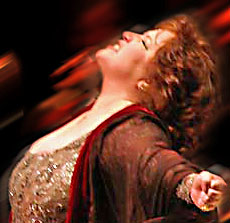 La Cieca hears that our dear Aprile Millo (who recently had to cancel a Teatro Grattacielo appearance due to illness) is ready to bounce back big time in 2008.
La Cieca hears that our dear Aprile Millo (who recently had to cancel a Teatro Grattacielo appearance due to illness) is ready to bounce back big time in 2008. Word on the street is that Millo will join longtime colleague Dolora Zajick for a bel canto duet in OONY's spring gala, followed by a return to the roster of the Metropolitan Opera for the 2008-09 season.
While we wait, here's some prime Millo via YouTube.
19 November 2007
Sediziose voci
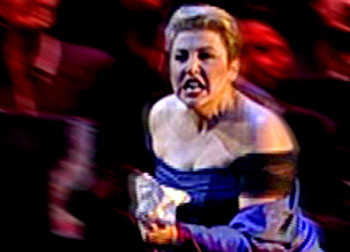 Now, you really didn't think La Cieca would let the occasion of Maria Guleghina's first Met Norma go unmarked, did you? Oh, please, don't be ridic, cher public! Surely the ascent of la Guleghina to the summit of bel canto is an experience that must be enjoyed communally. And since La Cieca has no intention of actually being in the theater for this event, she wants to invite you, you and most particulary you to join her for another edition of La Cieca's Opera Chat. The chat room "La Foresta d’Irminsul" will open at 7:15 p.m. on Monday, November 26 for the 7:30 curtain of Norma as broadcast on Sirius. Please check back on parterre.com on Monday for a link to "La Foresta d’Irminsul."
Now, you really didn't think La Cieca would let the occasion of Maria Guleghina's first Met Norma go unmarked, did you? Oh, please, don't be ridic, cher public! Surely the ascent of la Guleghina to the summit of bel canto is an experience that must be enjoyed communally. And since La Cieca has no intention of actually being in the theater for this event, she wants to invite you, you and most particulary you to join her for another edition of La Cieca's Opera Chat. The chat room "La Foresta d’Irminsul" will open at 7:15 p.m. on Monday, November 26 for the 7:30 curtain of Norma as broadcast on Sirius. Please check back on parterre.com on Monday for a link to "La Foresta d’Irminsul."
14 November 2007
Who's the missing star?
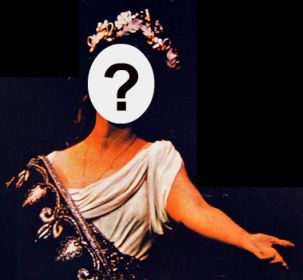 La Cieca was just wondering about something yesterday on opera-l, and doggone if Anne Midgette wasn't wondering about the same thing today in the New York Times. (That woman haunts my dreams, I tell you. It's like she's inside my head. Now, where was I? Oh, yes...) The point that dear Anne and I (among others) have mulling is this:
La Cieca was just wondering about something yesterday on opera-l, and doggone if Anne Midgette wasn't wondering about the same thing today in the New York Times. (That woman haunts my dreams, I tell you. It's like she's inside my head. Now, where was I? Oh, yes...) The point that dear Anne and I (among others) have mulling is this:There was a time when Norma was considered a rarity or at least an opera that could be revived only when a very special prima donna was available and willing. The first Met Norma, for example, was Lilli Lehmann, the house's biggest female star of that era. Even given Lehmann's réclame, her appearance as Norma was considered by at least one critic (W. J. Henderson in Times) to be a sort of stunt:
The opera was chosen by Fräu Lehmann for her benefit, and from a financial point of view her selection was a very wise one . . . . From an artistic point of view the choice does not seem to be so commendable. There is no artistic reason why Lilli Lehmann should present herself to the New York public as a colorature singer. She may have been actuated by a not unnatural desire to display her versatility, but to get up a performance of Bellini's "Norma" for her benefit savors rather of self-esteem than of a strong devotion to honest art . . . . She demonstrated that her voice possessed far more flexibility and that she had a greater command of the pure ornamentation of signing that anyone suspected ... It must be said, however, that Fräu Lehmann took many of the elaborate ornamental passages at a very moderate tempo and sang them with very evident labor, thus depriving them of much of that brilliancy which the smooth, mellow, pliable Italian voices impart to them. Fiorituri without brilliancy have no "raison d' étre," and no Italian diva of standing would have received half the applause that Fräu Lehmann did for singing these passages as she did. The audience was excited by astonishment at the fact that she could do it at all.Well, that was a longer pullquote than La Cieca originally intended to use, but, goodness, that is such excellent critical writing, isn't it? Anyway, back to the argument. Lehmann, Rosa Ponselle, Gina Cigna, Zinka Milanov and of course Maria Callas were all big established stars when they took on Norma at the Met. So were Joan Sutherland and Montserrat Caballé. If Shirley Verrett, Renata Scotto and Jane Eaglen received mixed reviews for their Met performances of the opera, it wasn't because of lack of star power or clout -- they were all extremely important names on the Met roster at the time of their casting.
Then there are performances from the likes of Adelaide Negri and Marisa Galvany -- (covers who had to go on) and Rita Hunter, one of the many jumpers-in for Caballé. The presence of Hasmik Papian at the beginning of this year's run of Norma should be understood in the same spirit, i.e., a late-in-the-game substitution.
Papian is going on for Maria Guleghina, who was pulled out of the beginning of the Norma run to perform the new production of Macbeth. So the question is, who ever dreamed up the notion of Guleghina singing Norma at the Met? True, she won a big popular success here with Abigaille back in 2001 and she more or less owned the role of Tosca at the house for about five years. But nothing in those performances (or, to be frank, her few attempts at the Bellini opera elsewhere) really shouts "this woman must do Norma at the Met." So why would a revival of Norma be put in the pipeline five years ago for a singer who neither then nor now promises to display anything special in the role?
Which is why La Cieca poses the question: was this revival of Norma originally planned for a different singer? And if so, who? Deborah Voigt? Violeta Urmana? Renée Fleming?
Labels: bel canto, caballe, critic, fleming, met, midgette, nyt, scotto, voigt
28 October 2007
I know a Malibran, she drives a moving van...

Labels: bel canto
13 October 2007
The season begins. Finally.
Labels: 2007, bel canto, critic, dessay, gcn, giordani, hunkentenor, met, netrebko, nyco, review, stephen costello
23 September 2007
Something to chat about
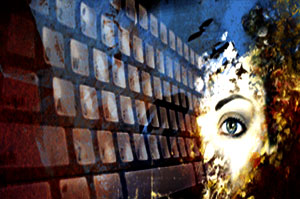 La Cieca's chat returns Monday night to welcome in the new Met season. Topic of discussion: the evening's prima of the new production of Lucia di Lammermoor, as broadcast on SIRIUS Internet Radio
La Cieca's chat returns Monday night to welcome in the new Met season. Topic of discussion: the evening's prima of the new production of Lucia di Lammermoor, as broadcast on SIRIUS Internet RadioNote that any of you who do not have a current subscription to Sirius can get a trial 3-day pass in time for the Opening Night chat. The event is also broadcast on RealNetworks.
Are any of you cher public attending this Lucia at one of the outdoor simulcasts? If you are, why not bring a laptop along and chat along with the rest of us? It's easy, now that the Lincoln Center plaza has WiFi!
Labels: 2007, bel canto, broadcast, chat, cher public, dessay, information wants to be free, met, sirius
20 September 2007
"She runs upstage screaming and then sits on the stairs laughing maniacally" is the new "weeping bitterly, she consents to the horrible bargain"
I'm sure some people will be up in arms over the production. It is set in the mid-19th century. The costumes are decent. Mariusz Kwiecien sounded good although he seemed to oversing at times, but I attribute that too the before noon rehearsal time. At any rate, he sounded amazing. In "Regnava nel silenzio," Zimmerman has an actress appear as the ghost that Lucia sings about. I'm sure some people will get their panties in a knot over it, but I think it was done pretty well.
In the mad scene, the set has a grand spiral stairway which leads to an open hallway which runs the entire length of the stage. Stage left is the bridal room. The top of the stairs is downstage right. Lucia enters wiping the blood of the dagger on her veil and then crosses to the top of the stairs. Just before she sings her first line, she runs down the stairs almost to the bottom of the stairway.
On the lines, "Un gelo me serpeggia nel sen! trema ogni fibra! vacilla il piè!" She slowly slumps to the stairs. She lies down on the step and then, fainting, rolls down the two steps to the stage floor. She eventually crosses downstage to the prompter's box where she sings much of the scene on her back. She sings, "Sparsa è di rose!" after holding up her bloody veil.
Later, she runs upstage screaming and then sits on the stairs laughing maniacally. Between verses of "Spargi d'amaro pianto", a doctor administers a shot (morphine?) which prompts the ornamentation of the second verse. Dessay is completely committed to the stage directions, so it works. I think she sounded good. I wish I had remembered my opera glasses. I was in the family circle.
Labels: 2007, bel canto, dessay, la cieca ci guarda la cieca ci vede, met
09 August 2007
Kunst overload
02 August 2007
Ou sont les podcasts d'antan?
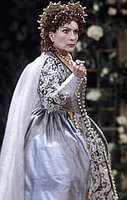 Update: beginning tonight on Unnatural Acts of Opera (2007 edition), a return to Italian opera, with one of today's most controversial cult divas starring as (what else) a conflicted queen. Nelly Miricioiu sings the role of Elisabetta I in Donizetti's Roberto Devereux, in a 2002 performance from the Royal Opera, Covent Garden.
Update: beginning tonight on Unnatural Acts of Opera (2007 edition), a return to Italian opera, with one of today's most controversial cult divas starring as (what else) a conflicted queen. Nelly Miricioiu sings the role of Elisabetta I in Donizetti's Roberto Devereux, in a 2002 performance from the Royal Opera, Covent Garden.La Cieca has now updated the feeds or whatever it is for the archived 2005 and 2006 episodes of Unnatural Acts of Opera. You can download these episodes in iTunes by clicking on 2005 or 2006. Your iTunes application will automatically launch and you can start listening within seconds.
For those using other podcatchers, you will need the RSS information for 2005 and 2006.
And for those of you who just want to hearken back to the golden age of unnatural acts, you can launch a player for 2005 or 2006 and listen while you continue your browsing.
A quick reminder: like NPR, Unnatural Acts of Opera is supported by your generosity. Won't you visit the Amazon Honor System and help out?
21 July 2007
18 June 2007
How tief is your love
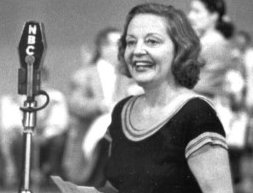 Surrounding the second act of D'Albert's opera Tiefland on the current episode of Unnatural Acts of Opera is a veritable plethora of special features. First, La Cieca takes a telephone call from an icon of stage, screen and recordings (hint: she was the surprise star of Broadway's Hit the Sky). Then our old, old, old friend Tallulah Bankhead drops by the studio along with none other than legendary, lovely Marlene Dietrich for a Sapphic singalong. After the act, your doyenne introduces the latest installment of The Enigmas of La Cieca, and, yes, it's another vocal identification. Take the quiz and determine your Norma-Q! Unnatural Acts of Opera.
Surrounding the second act of D'Albert's opera Tiefland on the current episode of Unnatural Acts of Opera is a veritable plethora of special features. First, La Cieca takes a telephone call from an icon of stage, screen and recordings (hint: she was the surprise star of Broadway's Hit the Sky). Then our old, old, old friend Tallulah Bankhead drops by the studio along with none other than legendary, lovely Marlene Dietrich for a Sapphic singalong. After the act, your doyenne introduces the latest installment of The Enigmas of La Cieca, and, yes, it's another vocal identification. Take the quiz and determine your Norma-Q! Unnatural Acts of Opera.
17 May 2007
Sometimes the cabin's gloomy and the table's bare
09 May 2007
Which Puritani: discuss.
The frisson that Anna Netrebko created at Met recently piqued my interest in the work again- but I find myself dissatisfied with the array of recordings available. Joan I’d have to quickly count out- a lot of the time it sounds like she’s singing the phone book. Not a Bonynge fan either. Ditto La Sills- I just don’t like the timbre of her voice. I own the Caballe/Kraus recording and enjoy it- even without most of the high notes and no trill from Montsy. Despite that she always wins me over and Kraus makes a good fist of Arturo- I don’t understand the negative crits he got for this recording. When are people going to realise that the high D’s and high F were not meant to be sung full voice- I feel sure they were supposed to be sung in head voice- esp as Arturo is at his most miserable when these notes pop up.
Devia is good, albeit a little colourless. Mateuzzi has the high notes- shame everything under a G is flat, flat, flat. Have you heard the Freni/Pav recordings? I’m interested to hear them. I also have the Callas recording- but I can’t BEAR Di Stefano- too much scooping and painful open high notes. Is there a fabulous recording I’ve missed? If only La Scotto had done it- she would have been ideal. (I too am a Scotto worshipper!)
Any suggestions greatly appreciated!
Labels: bel canto, caballe, callas, cher public, discuss, met
03 April 2007
Funny Lady
Presenting La Superba as La Duchesse de Krakenthorpe in La Fille du regiment.
28 March 2007
Balcony box
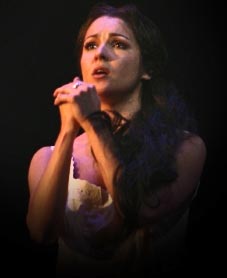 Something new and interesting (La Cieca hopes) on Unnatural Acts of Opera: a 2004 concert performance of Bellini's I Capuleti e i Montecchi, starring Anna Netrebko (Giulietta), Daniela Barcellona (Romeo) and Joseph Calleja (Tebaldo). Act One is the current podcast, with the second to follow on Friday.
Something new and interesting (La Cieca hopes) on Unnatural Acts of Opera: a 2004 concert performance of Bellini's I Capuleti e i Montecchi, starring Anna Netrebko (Giulietta), Daniela Barcellona (Romeo) and Joseph Calleja (Tebaldo). Act One is the current podcast, with the second to follow on Friday.Speaking of the lovely Miss Netrebko, she and Rolando Villazon will headline a gala celebrating 40th Anniversary of The Met at Lincoln Center next Tuesday. The concert will be webcast over the Met's RealNetworks (and of course Sirius) beginning at 7:00 PM. Unfortunately, La Cieca has a prior commitment that night, but she is sure that you, her cher public, will want to chat about the gala here at parterre.com. As such, La Cieca is sending out request to you parterre.com regulars for volunteers to host the web chat. (Quite simple, really: you'll need only to be online and on the chat site beginning at 6:45 and continuing until the finish of the broadcast.) If you're interested in helping out, email La Cieca at [email protected].
Labels: bel canto, broadcast, cher public, diva, met, netrebko, podcast, sirius, villazon
27 March 2007
Higher and higher
Part One Ah non ti son piu caraPart Two Non v'e per noi piu speme
26 March 2007
05 March 2007
It is good that young people should learn
 Iridiscent Ira Siff will give (though not too much) a master class under the auspices of the Metropolitan Opera Guild on Wednesday, March 7 at 4:15 - 5:30 P.M at DiCapo Opera, Lexington Avenue at 76th Street. He will coach three young singers on Mozart, Puccini and the bel canto. Some tickets will be available at the door for $10 (whisper "Ira sent me...")
Iridiscent Ira Siff will give (though not too much) a master class under the auspices of the Metropolitan Opera Guild on Wednesday, March 7 at 4:15 - 5:30 P.M at DiCapo Opera, Lexington Avenue at 76th Street. He will coach three young singers on Mozart, Puccini and the bel canto. Some tickets will be available at the door for $10 (whisper "Ira sent me...")Labels: bel canto
28 December 2006
Bel canto lushinghier
Next season (as you all know) opening night will be a new production of Lucia di Lammermoor starring Natalie Dessay. Sharing the role of Edgardo will be a trio of toothsome tenors: Marcello Giordani, Marcelo Alvarez and Giuseppe Filianoti. Further upping the hunk quotient will be Mariusz Kwiecien and John Relyea. The Mary Zimmerman production will be led (on opening night at least) by James Levine.
Oh, and for Druid fanciers, the outlook is not quite so rosy: a single revival of Norma next season with Dolora Zajick, Maria Guleghina and Franco Farina -- or, as Mme. Vera Galupe-Borzkh might sum it up: "Can Belto, Can't Belto and Can't Canto."
Labels: 2012, barihunk, bel canto, damrau, dessay, diva, filth, fleming, florez, gala, gelb, gheorghiu, giordani, la cieca ci guarda la cieca ci vede, levine, met, netrebko, villazon
30 March 2006
Gli enigmi sono due
Which soprano now has a large hole in her schedule half a year hence after canceling a bel canto role debut? She's been replaced by a considerate colleague who fortunately had a coordinating hole in her schedule (though, unfortunately, rather an unpleasant hole in her voice as well.)
09 January 2006
The dragon with the flagon
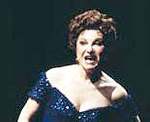 Soprano Mariella Devia -- who La Cieca thought was such a sweet ingenue type -- turns tigress for the title role of Lucrezia Borgia (Donizetti). This live performance from 2003 also features Daniela Barcellona (Maffio Orsini), Marcelo Alvarez (Gennaro) and Michele Pertusi (Don Alfonso, Duca di Ferrara) under the baton of Renato Palumbo. The Prologue of this gothic/bel canto masterpiece is now available on Unnatural Acts of Opera, with the following two acts to come later this week. (La Cieca apologizes for the occasional static audible during this podcast; its origin is the source material and she couldn't figure out a way to de-click it. Please let La Cieca know if you find the noise intrusive!)
Soprano Mariella Devia -- who La Cieca thought was such a sweet ingenue type -- turns tigress for the title role of Lucrezia Borgia (Donizetti). This live performance from 2003 also features Daniela Barcellona (Maffio Orsini), Marcelo Alvarez (Gennaro) and Michele Pertusi (Don Alfonso, Duca di Ferrara) under the baton of Renato Palumbo. The Prologue of this gothic/bel canto masterpiece is now available on Unnatural Acts of Opera, with the following two acts to come later this week. (La Cieca apologizes for the occasional static audible during this podcast; its origin is the source material and she couldn't figure out a way to de-click it. Please let La Cieca know if you find the noise intrusive!)
26 December 2005
Middle aged blues
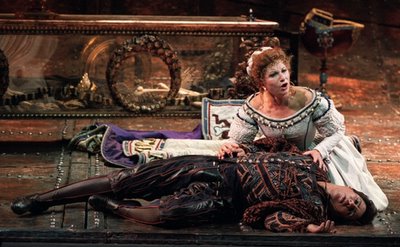
In the latest shipment from Berkshire, La Cieca has found a dazzler of a DVD: Lucrezia Borgia (Encore DVD 2087) from Milan, 2003, starring Mariella Devia, Marcello Alvarez, Daniela Barcellona and (Encore DVD 2087) Michele Pertusi. Renato Palumbo is the conductor. Excellent video of the stylish traditional production, and superb sound -- which is a particular plus since all the leads are in excellent voice. (This is the same staging that was so famously booed when Renaay appeared in it, and La Cieca has a better idea now why that demonstration was so vehement. Devia's Donizetti is elegance itself, with a pure line and imaginative but always idiomatic ornamentation. This, obviously, is the way the Milanese want to hear bel canto.) Look for the soundtrack to this production on "Unnatural Acts of Opera" within the next few weeks.
Labels: bel canto, blind, damrau, gelb, gheorghiu, met, netrebko
19 July 2005
Podcasta Diva: the finale
30 June 2005
Arrivals and, uh, non-arrivals
Which soprano should learn to care more about punctuality at her bel canto rehearsals? Toward her we feel nothing but love; only, we ask, is this any way to revive a dormant career?
And which other soprano with the voice of an angel (and the record contract to prove it), has returned to her accustomed role of spawn of Satan? How else could you explain such antics as clanging silverware onstage during another soprano's aria, hiring a claque to boo a rival, and now, playing hooky from the dress rehearsal of a new production to be recorded for DVD?
Now, ladies, don't get La Cieca wrong. She's totally in favor of colorful and volatile personalities in opera. But consider for a moment: does anyone actually recall how Maria Jeritza sang?
Finally, an item that's not blind! La Cieca is informed by one of her most reliable sources that Christopher Hahn will be the new Artistic Director of the Glimmerglass Festival. Expect an announcement within a couple of days. Smart money says Hahn will continue at Pittsburgh Opera, doubling up a la Paul Kellogg.
